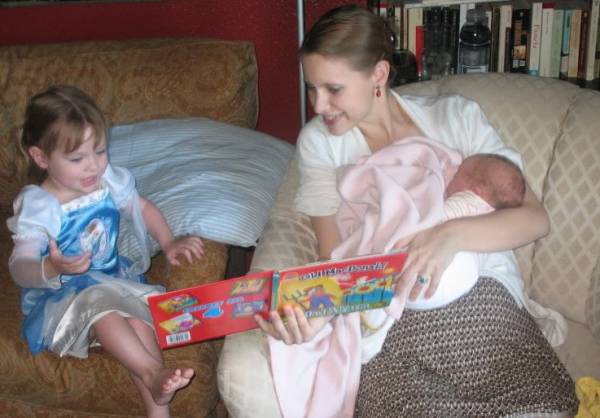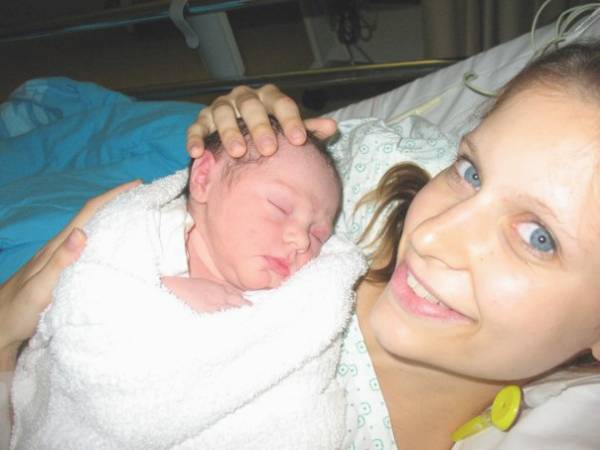The other day while I was out for a run, I noticed a thought process I’ve fallen into since becoming a mom. After going only a short distance, I started to get winded. My first impulse was self-criticism. But the more forgiving voice in my head said reassuringly: “You just had a baby. Cut yourself some slack.”
And then the not-so-nice reality set in. My “baby” is seventeen months old. I didn’t just have a baby. I don’t even technically have a baby in the house anymore. I have a toddler, and still I find myself struggling to do things that used to come easily.
My son and I in 2013, shortly after his delivery. He’s not a baby anymore.
How Long Does It Normally Take?
Recently in the United States, there has been a lot of talk about increasing the length of maternity leave for working mothers. This issue begs a question that is all too often glossed over by Instagram photos of perfect moms who are back to their pre-baby bodies after four weeks: How long does it really take to recover from giving birth?
In America, the standard answer is six weeks, or maybe eight if you had a c-section. Some people will say as little as three or four. For the sake of clarity, let’s consider what “recovered” actually means. Here are some common indicators women and medical professionals use to gauge postpartum recovery:
- Uterus is the same size it used to be
- No more bleeding
- Able to walk for extended periods without pain
- Able to have intercourse
- Back to pre-baby weight
These are all parts of the postpartum recovery puzzle. But what if you have all these pieces in place and you still don’t feel normal? And what if it’s been longer than six or even eight weeks?
Six Weeks Is Not Normal
It might take a long time to feel normal – much longer than six weeks. In a 2012 study, Dr. Julie Wray tracked the recovery of seventeen new mothers for the first seven months after delivery. The majority of mothers were skeptical of the common six-week timeframe for postpartum recovery. Wray reported in an interview, “The women considered the professional view of recovery from childbirth at six weeks to be a fantasy, and that a year was a more realistic timeframe.”
Wray’s research received a lot of attention, but it isn’t new news. A 1993 study published in the Archives of Family Medicine found 25% of new moms did not feel completely recovered from childbirth at the six-month mark. One-fifth of the subjects reported sexual difficulties even at the one-year mark.
“’The women considered the professional view of recovery from childbirth at six weeks to be a fantasy, and that a year was a more realistic timeframe.’”
I’m not trying to be Debbie Downer here, but if you’re expecting to feel completely, 100% back to your pre-baby self after only six weeks, you’re probably in for a rude awakening.

Home from the hospital with my second child in 2011. Her recovery was hardest due to complications from a c-section and adjusting to having two children.
“Normal” Is a Relative Term
So why the disparity between medical recommendations and reality? I think it has a lot to do with how we view the mother-child couple. In the United States, we tend to focus on the newborn’s needs. The new mother often fades into the background as a facilitator and nurturer. But who is nurturing her?
“For the vast majority of the world, it’s probably not normal to be lifting weights less than two months after giving a birth.”
In her article, Postpartum Beliefs and Practices Among Non-Western Cultures, Dr. Yeoun Soo Kim-Godwin described the isolation and frustration she felt after delivering her child in the United States, where birth practices differed greatly from her home country of Korea. She explained how her birth experience in the U.S. differed from her sister’s in Korea:
I remembered my sister’s postpartum recovery period in Korea. After having her baby, she came to our home to receive postpartum care from our mother. For about a month, my sister’s only duties were to eat and sleep to restore her health. In contrast, my American husband and his family treated me as a healthy person who could resume normal activities almost immediately. For example, my husband expected me to drive to the pediatrician’s clinic for the baby’s first physical checkup 7 days after giving birth.
In many non-Western cultures, women are just getting back to activity after the six-week mark. So if you’ve had a baby in the last few months and feel frustrated that things aren’t back to “normal,” consider it might be a matter of perspective. For the vast majority of the world, it’s probably not normal to be lifting weights less than two months after giving birth.
Maybe Normal Doesn’t Even Matter
Many women Dr. Wray interviewed expressed frustration with the pressure to be normal. Wray wrote, “During the provision of formal care giving, constructs of ‘normal’ were attached to women as midwives searched to manage the occupants of the wards.” These definitions of normal and the medical need to enforce them caused anxiety and stress in women, particularly in the first few weeks after childbirth.
“Ultimately it doesn’t matter if going to the gym six weeks after delivery is normal. What matters is whether or not you are ready.”
I encounter so many new moms who feel worried and anxious because they’re not back in the gym after a few months or even weeks. The big question on their mind is often, “Is this normal?” But ultimately it doesn’t matter if going to the gym six weeks after delivery is normal. What matters is whether or not you are ready.
Ask yourself these questions to determine whether your desire to work out for the first time is driven by false notions of normality or your own readiness:
- Is my desire based on comparison with others? Do I feel the need to get back in shape because Betty Burpee is doing CrossFit three weeks postpartum?
- Are my ideas based on my own previous birth and postpartum experiences?
- Do I feel a physical urge to work out? Or am I going to the gym because I feel like I “should” feel ready?
Sit with these questions for a while before your first time back to the gym. Having clarity about why you want to work out will help you be successful and prevent self-criticism. If your desire to work out is based on constructs that don’t apply to your unique postpartum body, I guarantee you will experience burnout and discouragement.

Holding my oldest daughter for the first time after emergency c-section in 2008. I thought I was back to “normal” within a few weeks of delivery but experienced severe breastfeeding complications three months after she was born.
Have the Strength to Not Be Normal
I know from experience that taking it easy is not easy, especially if you’re used to working out regularly. After each of my kids was born, I found myself asking questions like, “What about that mom I saw last week on Facebook who has five kids and just had a baby last month and is running a marathon this weekend? What about her?”
I still ask those questions today. I still have to face the fact that maybe right now I’m not that marathon mom, even seventeen months postpartum. But I’m figuring out how to find contentment in each unrepeatable experience. I’m learning the difference between contentment and complacency. And I’m starting to see when it comes to being a parent, being normal is for the most part irrelevant.
Related Articles:
- My Post Pregnancy CrossFit Comeback
- 5 Simple Tips for Postpartum Mental and Physical Health
- Battling the Baby Blues: How Exercise Can Help
- What’s New on Pulse Beat Fit Today






